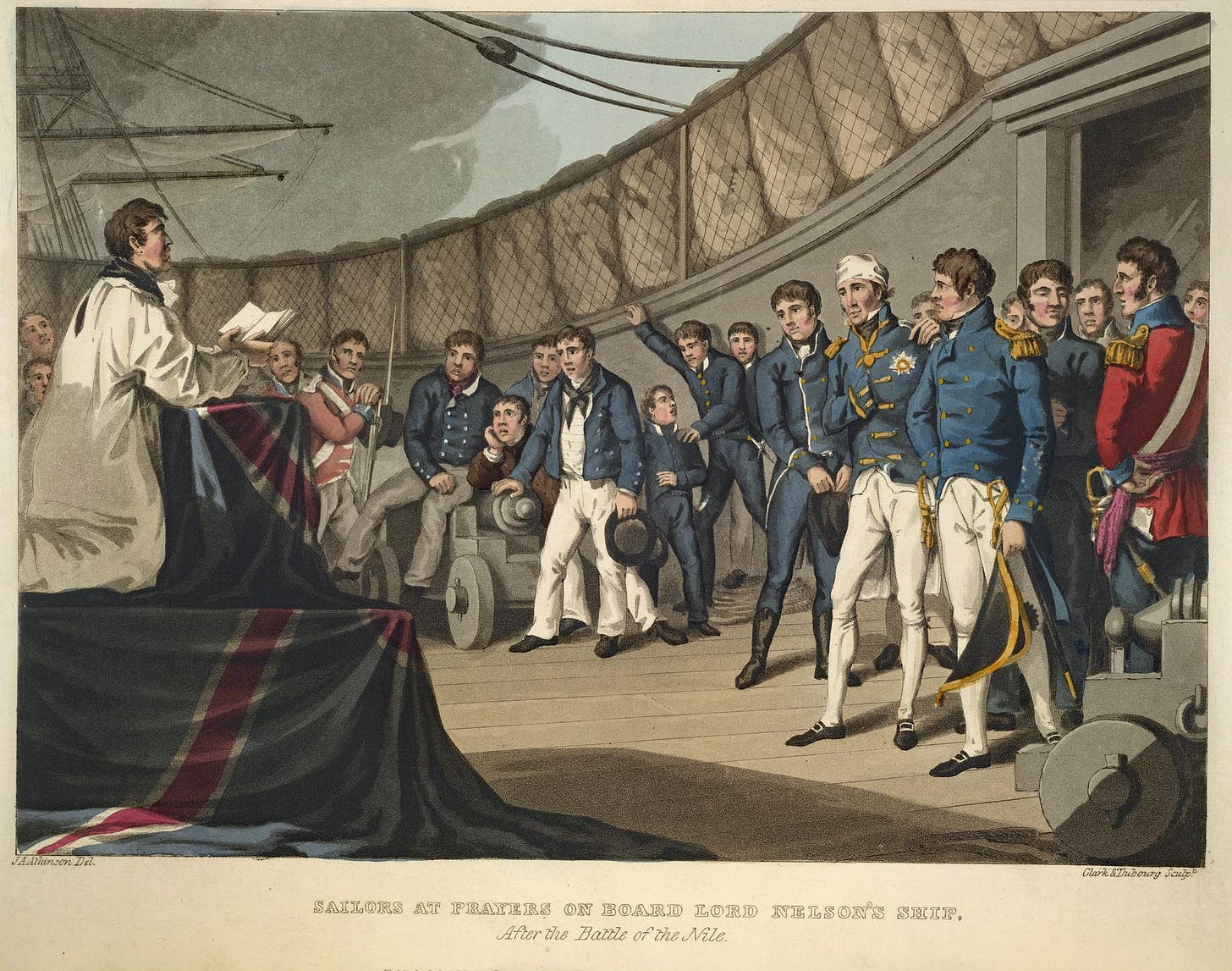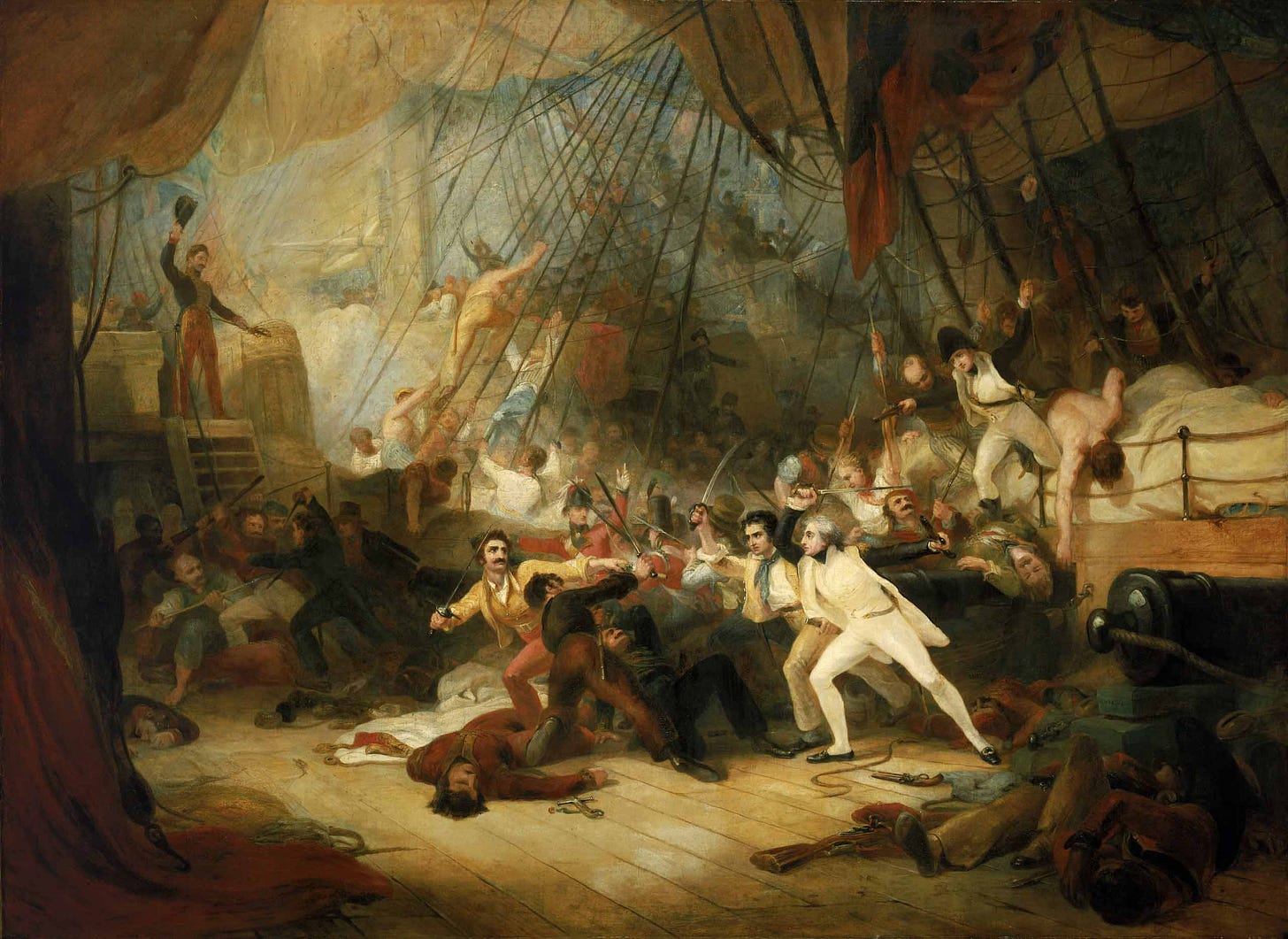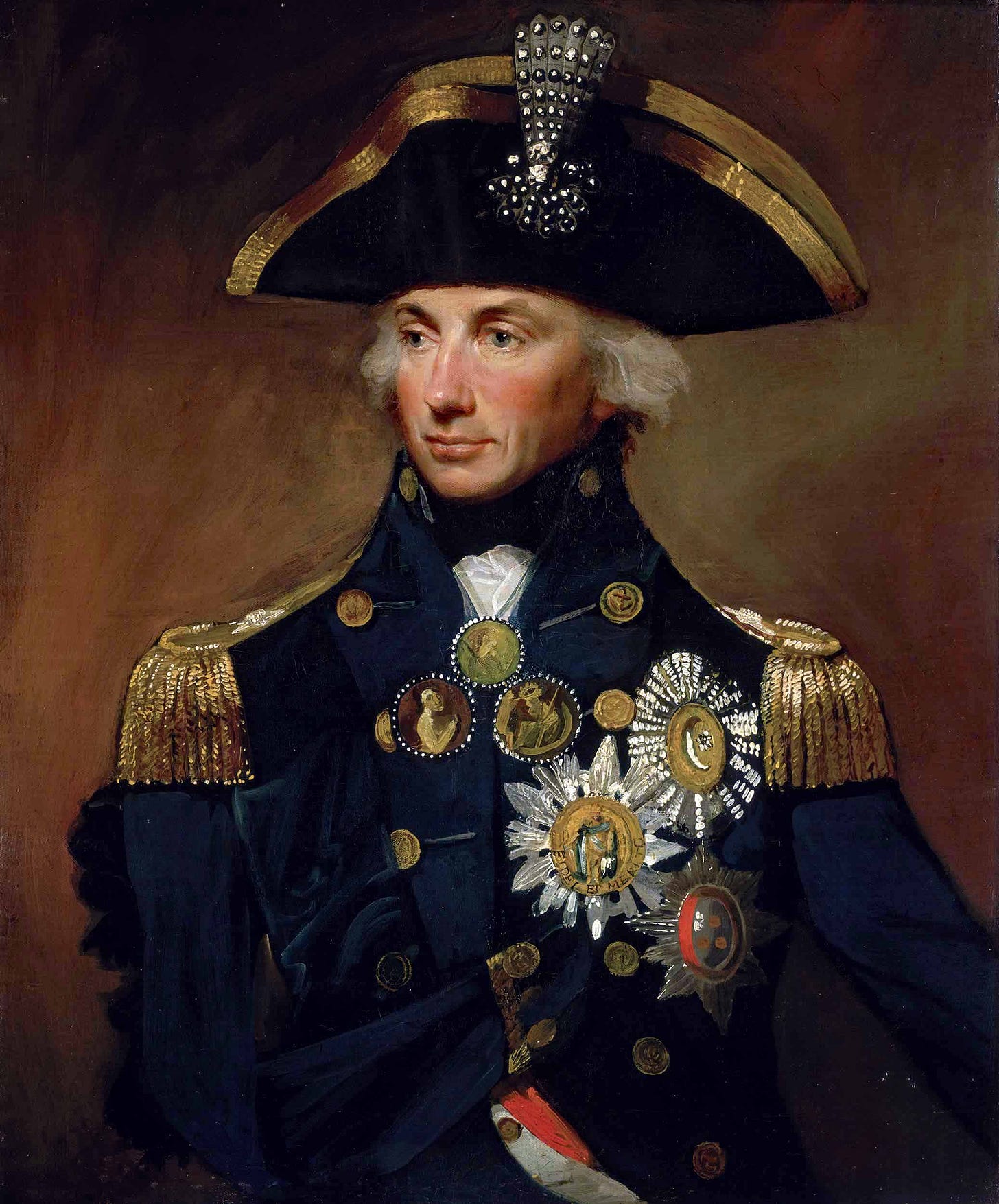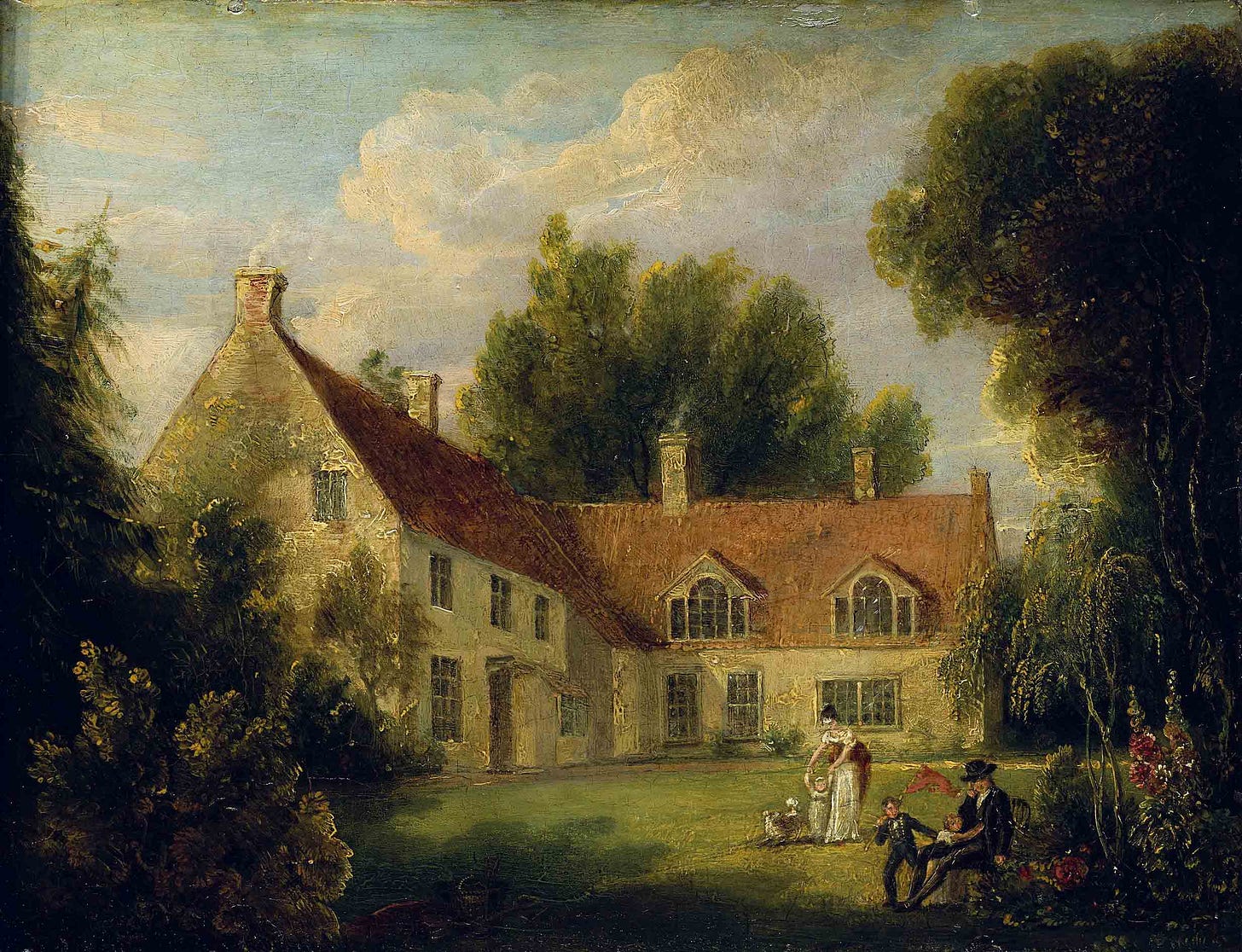What Makes a Hero?
What "Britannia’s God of War" can teach you about the nature of heroism...
220 years ago today, Britain experienced a day of glory and tragedy without equal in her history.
For on the 21st October 1805, just off Cape Trafalgar, Vice Admiral Horatio Nelson delivered his country a victory so absolute that Britain would not be challenged at sea again for over a century. Yet his hour of triumph would also be his last, as the Admiral fell to enemy fire, dying as he had lived — in the crucible of war, fearful only of disgrace and dishonour.
Christened “Britannia’s God of War” by Lord Byron, Nelson has ever after occupied the highest esteem in Britain’s pantheon of heroes, not least because there has yet to be another like him. But why is that? Why was Nelson a hero, and what made him so?
Today, we consider five qualities that define a hero, and what Nelson’s example can teach you about becoming one in your own right…
But first, a quick editor’s note! To commemorate the passing of Britain’s last great epic hero, James has recorded an hour-long interactive tour of Nelson’s life and what made him great.
In it, he takes you through Google Maps, primary texts, paintings, the Kingdom of Naples and more to bring Nelson’s world to life. Whether you want to learn from the principles of leadership that Nelson embodied or simply understand how he was raised and formed, this video is for you.
Click below to access the video — the first 20 minutes are free for all readers of INVICTUS!
1) Remembering Where You Come From
Over the course of his five decades of life, Nelson crossed the world’s oceans from the West Indies to the Bay of Bombay and the Arctic Circle. He would fight off the coast of Egypt and in the jungles of Nicaragua. Even by today’s standards, Horatio Nelson was well-traveled.
Yet the Nelson that faced these adventures was the Nelson formed by something closer to home — faith and family. Born not in London or Southampton, but the quiet Norfolk village of Burnham Thorpe, about an hour’s walk from the coast, the early life of Nelson was entirely rural. Similarly, he was the sixth of the eleven children of the Reverend Edmund Nelson and Catherine Suckling. Raised therefore by a clergyman in a village rectory, Nelson embraced from an early age the centrality of God to his life.
The success of Edmund in raising a Christian boy is evident from Nelson’s profound faith which accompanied him all the way from Burnham Thorpe to Trafalgar itself. Nelson wrote countless letters through his life, hundreds of which survive today, and seldom was faith absent from his words. We may consider, too, that just hours before he faced Destiny on the 21st October 1805, Nelson wrote the following prayer in his cabin aboard HMS Victory :
“May the Great God, whom I worship, grant to my country, and for the benefit of Europe in general, a great and glorious victory; and may no misconduct in any one tarnish it ; and may humanity after victory be the predominant feature in the British fleet! For myself individually, I commit my life to Him that made me, and may His blessing alight on my endeavours for serving my country faithfully! To Him I resign myself, and the just cause which is entrusted to me to defend. Amen, Amen, Amen”
Horatio Nelson, 21st October 1805

Similarly, after ordering the famous flag signal to his men, that England Expects That Every Man Shall Do His Duty, and hearing the thunderous roar of courage from the Royal Navy, Nelson placed himself in the hands of God:
“Now I can do no more. We must trust to the Great Disposer of all Events, and the Justice of our Cause. I thank God for this great opportunity of doing my Duty”
Horatio Nelson, 21st October 1805
Amid his travels and battles, Nelson did not forget the values with which he was raised, nor the people or places which had instilled them. Throughout his career, Nelson remained in regular contact with his father, and as the Reverend Nelson celebrated his son’s victories, he expressed his pride in the latter’s faithful anchor:
“Joy sparkles in every eye, and desponding Britain draws back her sable veil and smiles. It gives me inward satisfaction to know, that the laurels you have wreathed sprung from those principles and religious truths which alone constitute the Hero, and though a Civic Crown is all you at present reap, it is to the mind of inestimable value, and I have no doubt will one day bear a Golden Apple”
The Reverend Edmund Nelson to Horatio Nelson, 1797
We hear from the Reverend too that Nelson’s successes would be felt back home in a manner appropriate to his faith, when in the Christmas of 1794, for example, Edmund endeavoured “to distribute your Christmas gift in the best manner I could think of, chiefly in a little warm clothing to the widows and orphans, and very old men : blessed is the man who considereth the poor and needy”.
Horatio Nelson left home, but home never left Horatio Nelson, and nor should it you…
2) Believing in Heroism

Horatio Nelson believed in God, yet so too did he believe in glory, and both would together inspire him in his darkest moments.
Among the very lowest points indeed of Nelson’s life was defined by such an epiphany, when during his posting to India in 1775, he developed a near lethal case of malaria:
“I felt impressed with a feeling that I should never rise in my profession. My mind was staggered with a view of the difficulties I had to surmount, and the little interest I possessed. I could discover no means of reaching the object of my ambition. After a long and gloomy reverie, in which I almost wished myself overboard, a sudden glow of patriotism was kindled within me, and presented my king and country as my patron. Well, then, I will be a hero! and, confiding in Providence, I will brave every danger!”
Horatio Nelson, as reported in Life of Nelson, Southey, 1813
Nelson was fond of recalling this moment later in life, often saying that following this realisation “a radiant orb was suspended in his mind’s eye, which urged him onward to renown” (Southey, 1813).
In other words, Nelson became a hero first and foremost because he himself decided to be one. Not that this meant that the road to heroism was direct, for Nelson would suffer a great many setbacks on his way to that coveted glory, which would test both his resolve and faith.
In 1795, the year after an explosive round in the Siege of Calvi had robbed him of sight in his right eye, the successful though not yet famous Nelson confided to his wife in a letter:




